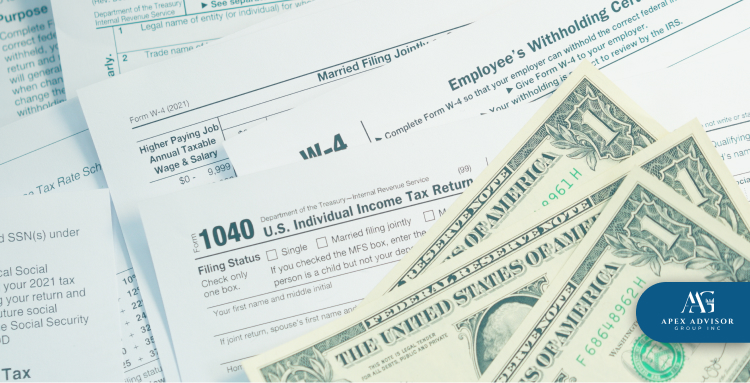Common Tax Preparation Mistakes to Avoid

November 14, 2024
Filing taxes—two words that can send a shiver down anyone’s spine. Between hunting down paperwork, double checking deductions, and trying to make sense of tax jargon, it's no wonder people often make costly mistakes. However, the good news is that avoiding these blunders isn’t as hard as it seems.
Whether you’re filing solo or leaning on a pro, sidestepping common tax prep mistakes could save you a headache (and a chunk of change). From missed income to math slip-ups, we’re breaking down the usual suspects in tax errors and showing you how to dodge them with ease.
1) Missing income reports can lead to audits and potential penalties.
The IRS receives all your income information from various sources, so when something’s missing—like a side gig or freelance project payment—it raises a red flag. Even a small amount left unreported can lead to discrepancies that might trigger an IRS audit or, at the very least, delays in your return. Plus, if adjustments are needed, you may end up owing more tax than anticipated.
How to Avoid It:
Keep track of every income source, even if it’s not a traditional 9-to-5 paycheck. Go through your W-2s, any 1099 forms for freelance or contract work, and other income records like rental or investment earnings. Before filing, make a quick checklist to confirm you’ve included it all. For an extra safeguard, tax prep software can help spot missing entries and ensure nothing falls through the cracks.
2) Wrong filing status can increase your tax rate or reduce credits
Filing status might seem straightforward, but picking the wrong one can mean paying more in taxes or missing out on valuable credits and deductions. For instance, filing as "Single" when you qualify as "Head of Household" could cost you a lower tax rate and credits designed to ease the burden for families. The IRS uses your filing status to calculate your tax bracket, eligibility for tax breaks, and even refund amounts, so getting it wrong can throw your whole return off balance.
How to Avoid It:
Take a few moments to review the specifics for each filing status: single, married filing jointly or separately, head of household, and qualifying widow(er). If you’re unsure which category fits you best, especially if you have a unique situation like shared custody or recent changes in marital status, consider checking in with Apex Advisors. We can make sure you’re maximizing benefits and keeping your tax bill as low as possible.

3) Missed deductions or credits can cost you in taxes or a lower refund
Leaving deductions or credits on the table is like waving goodbye to money you could’ve kept in your pocket. Tax credits directly reduce what you owe, and deductions lower your taxable income—both can make a significant difference in your final tax bill. Overlook education credits like the American Opportunity Credit, healthcare deductions, or even credits for energy-efficient home improvements, and you could miss out on substantial savings.
How to Avoid It:
Take a little time to explore what deductions and credits you’re eligible for, especially if you had big expenses in areas like healthcare, education, or home ownership. Look into credits like the Earned Income Tax Credit (EITC) if you qualify, or deductions for student loan interest. To make it easier, tax software often has built-in prompts for these items, or we can guide you through any credits specific to your situation. The more you know, the more you can keep from slipping through the cracks.
4) Filing with Incorrect Social Security Numbers
A simple typo in a Social Security number can bring your tax filing to a screeching halt. Since the IRS uses these numbers to match tax records, even a minor mistake—like flipping a digit or missing one altogether—can lead to a rejected return, delays in processing, and potentially lost deductions or credits tied to dependents. If you're counting on a quick refund, an error here can be a frustrating roadblock.
How to Avoid It:
Before you hit “submit” or mail in your return, do a quick verification of each Social Security number on your forms. This includes double-checking for yourself, your spouse, and any dependents. Take a few extra seconds to make sure every digit is in the right place. If you’re using tax software, take advantage of the prompts for review—they’re there to help you catch issues like this before they cause delays.

5) Miscalculations can result in overpayments, underpayments, or IRS corrections
It’s easy to think a small miscalculation won’t cause too much trouble, but in tax filings, even a minor math slip can throw off your entire return. An error might mean overpaying, underpaying, or even raising red flags for further IRS review. Plus, if the IRS catches the mistake, they’ll correct it—often delaying any refund you were expecting or potentially increasing the amount you owe.
How to Avoid It:
Skip the manual math and use tax software, which does the heavy lifting for you. Many programs automatically calculate figures based on the information you input, making it less likely for a simple error to slip through. If you’re handling a complex return, we can also double-check everything, ensuring your calculations are spot-on.
6) Incorrect Bank Information for Direct Deposit
Imagine waiting weeks for your refund, only to discover it’s been delayed—or worse, sent to the wrong account—because of a tiny error in your bank details. Mistakes with routing or account numbers can lead to lengthy delays or, in rare cases, funds being deposited into someone else’s account. Fixing these issues with the IRS or your bank can be time-consuming and frustrating.
How to Avoid It:
Before you submit your return, take a moment to verify that your routing and account numbers are exactly right. Check each digit, or better yet, grab a bank statement to cross-reference. Many tax software platforms prompt you to confirm this information, so use that extra nudge as a final safeguard. A few seconds of rechecking can save you from weeks of refund delays.
7) Missing the Filing Deadline
Letting the tax deadline slip by without filing or requesting an extension can be more costly than you might think. The IRS charges penalties and interest on late payments, which can stack up quickly if you’re not prepared. Worse, if you’re expecting a refund, filing late could delay it significantly, leaving you waiting longer than necessary for your own money.
How to Avoid It:
Set yourself up for success by marking the tax deadline on your calendar or setting a reminder a few weeks ahead of time. If life gets in the way and you realize you need more time, file for an extension—it’s simple, and it gives you an extra 6 months to get your return in without penalties. A little planning goes a long way toward keeping those deadlines stress-free.

8) Not Keeping Copies of Past Returns
Think of your past tax returns as your backup plan. If the IRS ever comes knocking with questions or you need to reference something for a future filing, having easy access to those records is a lifesaver. Without them, you might find yourself scrambling for details or losing out on valuable information that could simplify this year’s return.
How to Avoid It:
Set up a secure system for storing both digital and physical copies of your tax returns. The IRS generally recommends keeping these records for at least 3 to 7 years, so scan them and back them up digitally for safekeeping. Keeping past returns organized not only provides peace of mind but also makes filing future returns easier and more accurate.
9. Improperly Claiming Dependents
Claiming a dependent on your taxes can bring valuable credits and deductions, but if you don’t meet IRS guidelines, it can backfire. Mistakenly claiming a dependent can lead to penalties, and if the IRS spots an error, you could miss out on benefits you were counting on. This is especially tricky in cases of shared custody or when dependents are older, like college students.
How to Avoid It:
Before adding anyone as a dependent, review the IRS rules carefully, particularly if you share custody or if the dependent is 18 or older. Situations involving children of divorced parents or multi-generational households can be complex, so make sure you’re on solid ground with the guidelines. When in doubt, a quick consult with Apex Advisors can ensure you’re claiming dependents accurately—and keeping those benefits intact.
Apex Advisor Makes Tax Season Easy and Error-Free
If you’re ready to take the guesswork out of tax preparation, let Apex Advisor handle it all. Our team of tax experts is dedicated to making sure your return is complete, accurate, and filed with maximum benefits in mind. Whether it’s managing complex filings, optimizing deductions, or catching the smallest details, we have the knowledge and tools to make your tax season seamless. Reach out today and experience stress-free tax handling from the professionals who put your peace of mind first.
